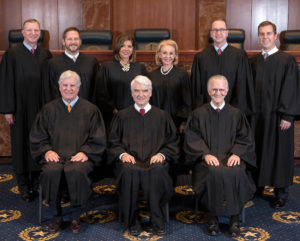
Can boilerplate language in a contract shield individuals and businesses from being held accountable for committing felony fraud and other violations of state law if the victim in a civil lawsuit unwittingly signed a pact agreeing that everything was okay?
Appellate law experts say the Texas Supreme Court may be on the verge of making such a legal principle – that terms of a contract override specific state laws and stated legislative policy – the official law of the land in Texas.
In a potentially precedent-setting case that is being closely followed by business lawyers, attorneys for Mercedes-Benz USA say their client should not be legally responsible for repeated misrepresentations and alleged fraudulent conduct against a South Texas care dealer because the dealer signed a contract agreeing that he relied only on the terms identified in the contract.
The Harlingen car dealer, Carduco Inc., argues it only signed the contract because Mercedes executives lied and made multiple misrepresentations about their partnership – misrepresentations that a jury found was essentially felony fraud.
The dispute between Mercedes and Carduco, according to legal experts, pits the current state Supreme Court’s love affair with and reliance on contracts against another devoted principle of the justices – the clear and unambiguous intent of the state Legislature.
In essence, the Texas Supreme Court is being asked to declare that signed written contracts are sacrosanct and override all extra-contractual statements, even if those extra-contractual promises amount to fraudulent activity.

“If the Texas Supreme Court does indeed rule that, based on a contract between the parties, a business is free to commit felony fraud and make substantive misrepresentations, that would be one of the most significant decisions the Court has made in my 20 years of practicing appellate law,” said Dallas appellate law expert Chad Ruback. “Like you, I was taught in law school that contracts that allowed for statutory violations were invalid.”
The Texas Lawbook reported on Dec. 3 that Mercedes-Benz v. Carduco was scheduled to be argued that week. The legal briefs in the case focused heavily on the validity of the trial court’s $115 million punitive damage verdict against Mercedes.
But the oral argument last week took a decidedly different turn.
A lawyer for Mercedes spent the entire 20 minutes focusing on the contract that the owner of Carduco signed with Mercedes, which they argued eviscerated the entire case against their client.
Legal observers in attendance and others who watched the video of the oral argument said the justices seemed receptive to Mercedes’ position.

“The issues on both sides are important and fundamental, and it’s possible that a consensus will form around affirming the court of appeals’ judgment,” said Houston appellate law expert Jeff Nobles. “The justices seem to be leaning toward reversal [of the verdict against Mercedes].
“As Chief Justice Hecht often says — tongue-in-cheek — they don’t grant review to affirm – but sometimes they do,” Nobles said. “There were a couple of questions that could be interpreted as being favorable to the respondents, so there may be some support for affirming.”
Mercedes-Benz v. Carduco is a decade-long, nine-digit-dollar dispute between two businesses. Carduco claims that Mercedes and three of its executives intentionally devised a scheme to defraud the South Texas car dealer by sabotaging his business.

A Cameron County jury heard two weeks of evidence and ruled that the elite automaker pressured Carduco’s owner to spend millions of dollars to relocate the dealership to McAllen, but that Mercedes secretly negotiated a separate agreement to move into the same town, which Mercedes knew would severely damage revenue and profits at Carduco.
“Mercedes’ corporate representatives admitted that the information passed on to Carduco was false, misleading and untrue,” says Carduco’s lawyer Pete Marketos, a partner at Reese Marketos in Dallas.
The jury awarded Carduco $15 million in compensatory damages and also found “beyond a reasonable doubt” that Mercedes’ conduct violated the state’s deceptive trade practices laws and ordered the automaker to pay $115 million in punitive damages.
Mercedes appealed to the Texas Thirteenth Court of Appeals in Edinburg, which upheld the jury’s finding that the automaker committed fraud and the $15 million in actual damages. The appellate judges, however, struck down the $115 million punitive damage award as excessive.
Both sides appealed to the Texas Supreme Court.
Marketos argues that the punitive damage verdict – or at least a large portion of it – should be reinstated. If the state justices were do to that, it would be the largest dollar award reinstated by the state’s highest court in decades.
Lawyers for Mercedes argue that the Supreme Court should ignore the jury’s findings that their clients committed fraud completely and instead focus on the fact that the two parties had a written contract that allowed the company to do what it did.
The defendants argue that the $15 million in compensatory damages also should be zeroed out because Carduco’s complaints are “directly contradicted” by the terms of the contract that the car dealer signed with Mercedes-Benz.

“The court of appeals’ opinion improperly allows a sophisticated party to rewrite a commercial contract by claiming that the defendants induced it to believe it had a bargain for oral terms in direct conflict with the terms of the signed agreement,” former Chief Justice Tom Phillips, now a partner at Baker Botts, wrote on behalf of his client, Mercedes. “This result is indefensible.
“No contract is safe under the court’s opinion,” he states.
Former Texas Chief Justice Wallace Jefferson, who represents Carduco, argues that Mercedes’ position is contract law rule amuck. Jefferson points out that his client signed the contract only after Mercedes officials repeatedly lied to or misled the dealership.

To adopt Mercedes’ argument, Jefferson says, would basically be giving companies the green light to commit felony fraud as long as they have a contract that excuses it.
Leaders of the Texas Automobile Dealers Association, Texas Motorcycle Dealers Association and Texas Recreational Vehicle Association asked the Texas Supreme Court to rule in favor of Carduco the relationship between car dealers and the automakers is “fiduciary in nature” and is “bound together in good faith and dependent upon fair dealing.”
“The use of fraud, misrepresentations and intentional omissions have no place in the motor vehicle franchiser-franchisee relationship,” TADA General Counsel Karen Phillips wrote in a brief to the justices. “Mercedes embarked upon a scheme to defraud [Carduco] with a planned result that [the owner] would lose his business, his investment and his franchise.
“The fraud by Mercedes was both material and relied upon,” she wrote. “The fraud here cannot stand as it impacts not only the parties but the community at large.”
Nobles said he expects the Texas Supreme Court will make a narrow holding in the case in an effort to “avoid having extreme facts like these making bad law.”
“If the justices affirm, it will validate the position of Texas auto dealers that the Texas Business Occupations Code allows them extra protection form conduct that causes the loss of a dealership that is remediable in a fraud action,” Nobles said. “If it reverses, it will continue a trend in which the Court has narrowed the exceptions for maintaining a cause of action for fraud between the parties to a contract.”
